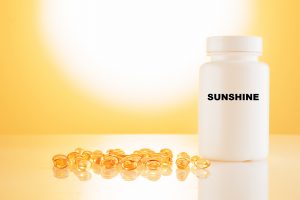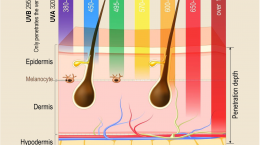Published on February 18, 2022
While vitamin D supplements can partially make up for inadequate sun exposure, no supplement can replace all the benefits provided by sunshine
Key Points
- The vitamin D level is often used as a measurement for sun exposure, and especially for those who don’t supplement with vitamin D, a vitamin D deficiency can also indicate “sunshine deficiency”
- Sunlight contains different wavelengths of light, emitting multiple types of energy, including red, near infrared, far infrared, and blue light, each of which offers some unique health effects
- Getting regular sun exposure can be beneficial to your health, but to avoid risks of overexposure to the sun, take care not to burn!

With Spring still a month away, most of those in the Northern Hemisphere are still in the deep of Winter and are likely experiencing “Sunshine Deficiency.” Not only are the UVB rays from the sun not available to produce vitamin D for many during this time, but the cold and wintery weather can keep us indoors, covered up, and avoiding any sunshine exposure.
Vitamin D is Only One of the Many Health Benefits of Sunshine Exposure
The vitamin D level is often used as a measurement for sun exposure, and especially for those who don’t supplement with vitamin D, a vitamin D deficiency can also indicate “sunshine deficiency.” It is important to remember, however, that sunshine has many health benefits beyond vitamin D production. Exposure to the sun helps the body produce other important chemicals and nutrients, such as nitric oxide and melatonin. Sunshine exposure also results in the production of serotonin and beta-endorphins, which promote mood enhancement and relaxation, relieve pain, and boost immunity. Proper sun exposure is a must, with the most important rule being “don’t burn!”
Supplements Do Not Replace Sunlight
Taking a vitamin D supplement cannot replace all the benefits of a lifestyle that incorporates regular sunshine exposure. For a quick and fun way to learn about those benefits, watch the video below, and make note of the summary below.
Here is a summary of the key points discussed in the video, with a few added details:
Sunlight contains different wavelengths of light, emitting multiple types of energy, including red, near infrared, far infrared, and blue light, each of which offers some unique health effects
Nitric oxide is released when the skin is exposed to the sun’s UVA rays; it is beneficial for heart health, helps relax the blood vessels, reduces blood pressure, plays a key role in immunity, cellular function, neurotransmission, and has antimicrobial and anticancer effects
UVB exposure is the body’s natural way to produce vitamin D; while it is possible to make enough vitamin D from sun exposure to reach the scientists’ recommended 40-60 ng/ml (100-150 nmol/L), many don’t make enough vitamin D from sun exposure due to lifestyle, where we live, clothing, sunscreen, or other circumstances
Exposure to both UV and blue light helps to regulate the circadian rhythm and sleep cycle
Red light promotes wound healing and tissue repair, and builds collagen to reduce wrinkles
Sunlight exposure also results in the production of serotonin and beta-endorphins, which promote mood enhancement and relaxation, relieves pain, and boosts immunity
To avoid risks of overexposure to the sun, take care not to burn!
Indoor options, such as phototherapy units, sunbeds, and lightboxes, can be used when the sunshine is not an option
Balancing Sunshine Exposure and Supplements for Vitamin D Throughout the Seasons
As the seasons and your sun exposure change, you may need more or less vitamin D intake from supplements in order to maintain your desired vitamin D level. To help you determine how much, test your vitamin D level at least twice per year, and based on your level, calculate how much vitamin D supplementation may be needed, or if other lifestyle changes (such as sunshine or indoor UVB) could be implemented to help reach and maintain target levels year-round.
Are You Getting Enough Vitamin D (and Sunshine) for Your Health Concerns?
 Having and maintaining healthy vitamin D levels and other nutrient levels can help improve your health now and for your future. Choose which additional nutrients to measure, such as your omega-3s and essential minerals including magnesium and zinc, by creating your custom home test kit today. Take steps to improve the status of each of these measurements to benefit your overall health. You can also track your own intakes, symptoms and results to see what works best for YOU.
Having and maintaining healthy vitamin D levels and other nutrient levels can help improve your health now and for your future. Choose which additional nutrients to measure, such as your omega-3s and essential minerals including magnesium and zinc, by creating your custom home test kit today. Take steps to improve the status of each of these measurements to benefit your overall health. You can also track your own intakes, symptoms and results to see what works best for YOU.
Enroll and test your levels today, learn what steps to take to improve your status of vitamin D (see below) and other nutrients and blood markers, and take action! By enrolling in the GrassrootsHealth projects, you are not only contributing valuable information to everyone, you are also gaining knowledge about how you could improve your own health through measuring and tracking your nutrient status, and educating yourself on how to improve it.





